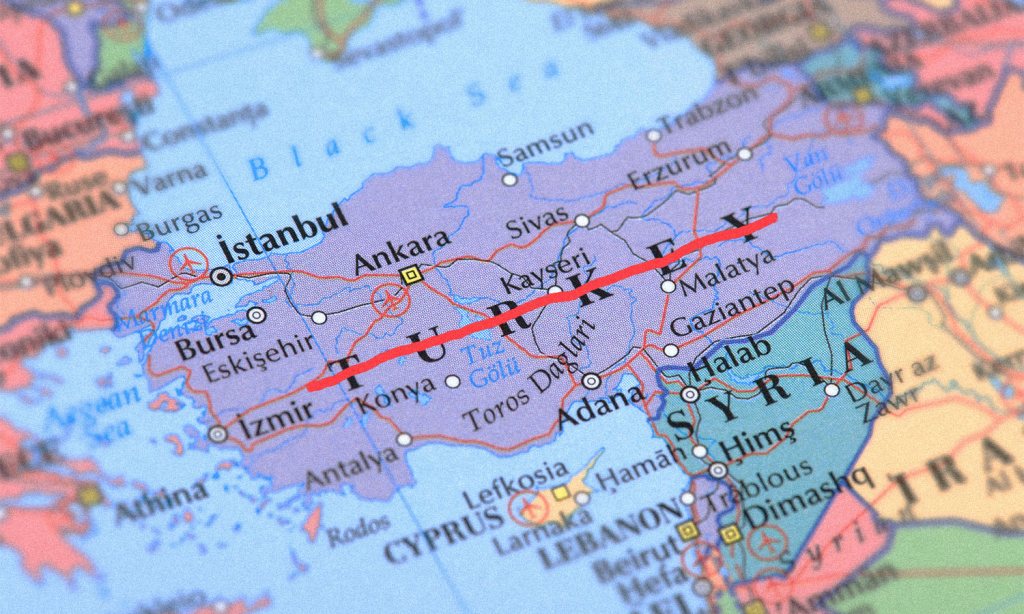With the country of Turkey, or Türkiye, making headlines around the world for the devastating earthquake that struck its south-eastern region on Monday, some people have been wondering what’s up with the sudden name change.
Türkiye, as it’s properly known, officially changed its name from the more anglicised version ‘Turkey’. But this wasn’t a recent shift — it actually happened in May of last year.
Turkish Foreign Minister, Mevlüt Çavuşoğlu, requested the official name change from the United Nations, and they agreed in June. The US State Department announced they would accept the name change at the start of this year.
Style guides and international bodies are still being updated accordingly, including in the country itself, where the name is widely used and still slips into official state broadcasts from time to time.
“Türkiye is the best representation and expression of the Turkish people’s culture, civilisation, and values,” the President, Recep Tayyip Erdogan, said in December of 2021. It was back then that he ordered products made in the country to switch from including the phrase ‘Made in Turkey’ to ‘Made in Türkiye’.
Türkiye hasn’t been officially adopted as the name for the country in Australia, although the Department of Foreign Affairs appears to have been using it since at least 2019. Under the Department’s country information page, the name ‘Türkiye’ is used, although it appears to be used interchangeably in official statements.
The fact that many of us are just learning about this name change now is a testament to how little time we spend thinking about the nation that 33,000 of us visit each year. That is until something awful happens, and the country, and its new name, are once again thrown into the spotlight.
How to Pronounce Türkiye
Okay, so Türkiye is actually kind of a fun word to say.
It’s pronounced ‘Tour-key-yay’, which makes it sound like they just did one of those hokey brand puns for Pride Month (Looking at you BWYaaas).
The pronunciation is more in line with the way that the country name is actually said in Turkish. The ‘Ü’ sounds like the ‘U’ in the English words ‘cue’ or ‘pure’, and the ‘E’ at the end sounds like the ‘E’ in the word ‘pet’.
When the country changed its name, it launched a tourism campaign called ‘Hello Türkiye’ featuring lots of people saying the new name over and over so that we all get it.
Why is Turkey Now Called Türkiye
The name change was, quite literally, a re-branding exercise. President Erdogan is facing another round of tough elections in June of this year, and the country is going through a tough cost of living crisis. That was before this horrific earthquake struck.
He had hoped that by re-branding as ‘Türkiye’, associations between the country’s poor human rights record, its history of unrest, and political oppression would be wiped clean, and that tourists would be more inclined to visit the country and spend their money.
In addition, and in all seriousness, the country was also fed up of sharing a name with a bird that Americans slaughter en mass each year to celebrate how thankful they are that the Indigenous population didn’t off them when they had the chance.
TRT World, the country’s English language broadcaster, said at the time that the word also evokes “a muddled set of images, articles, and dictionary definitions.”
“Flip through the Cambridge Dictionary, and ‘turkey’ is defined as ‘something that fails badly’ or ‘a stupid or silly person’.” And said company wasn’t super stoked with this.
They also stated, at the time, that Turkish people prefer their own name for the country as it creates a sense of self-definition and determination in how they are identified.
Do We Have To?
In a sense, Türkiye has defined its own pronouns, and we should all respect them. That being said, the Middle Eastern political analyst Yörük Işık argued that the re-brand was an exercise in distraction and a way for Erdogan to change the subject away from his authoritarian rule.
“Turkey is crumbling under possibly the biggest financial crisis since the Second World War. Our two neighbours are at war with each other. There is a world food security crisis. And this is the moment we decide to change the country’s name?,” he told NPR last year.
Commentators also pointed out that changing the name to one that features letters not found in the English alphabet, or on English keyboards, would ensure it doesn’t gain traction.
While the name might not be ideal, it’s not entirely uncommon for countries to decide they want to be called something else. However, whether or not we listen is another story. The Czech Republic told us all they wanted to be referred to as Czechia a few years ago, and we all nodded and promptly ignored them. The Netherlands also decided they no longer wanted to be referred to as ‘Holland’ since the two-name thing was confusing. Swaziland, in southern Africa, also swapped its name for the less colonial Eswatini,so people would stop getting them mixed up with Switzerland. Maybe we should have a word with Austria.
But the justification for Türkiye is different. Virtually every country refers to itself as something other than the English version of its name and is relatively okay with being called by its English name by foreigners. Germans refer to their own country as Deutschland, for example, while the Finnish call their country Suomi. China self-identifies as Zhongguo while Greece is Ellada.
Türkiye, while slightly confusing, is probably how we should refer to the country. But don’t feel too bad if you want to keep using Turkey for the sake of clarity.
Related: Earthquake in Türkiye — Here’s What You Can Do to Help
Related: Australia Post Now Encourages Traditional Place Names on Parcels and Letters
Read more stories from The Latch and subscribe to our email newsletter.







